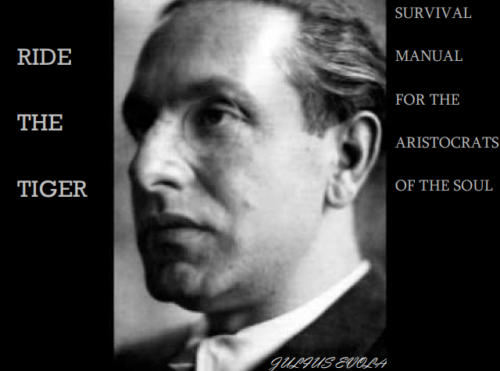
This reading continues on from here.
Part Four of Ride The Tiger is called ‘Dissolution of the Individual’ and is comprised of three essays. The first of these, the sixteenth in the book, is called ‘The Dual Aspect of Anonymity’. Railing against the “collectivism, mechanization, standardization, and soullessness οf modern existence,” here Evola attempts to find an answer to the question of what is worth saving.
It’s at this point that Evola finally gets to the esotericism. Individualism is part of the problem facing us, he contends, because it has led to the atomisation of society. Worse, it has no spiritual basis. What is taken by Westerners to be the individual is not what a person really, fundamentally is.
In esoteric terms, Evola is here talking about the difference between silver and gold. Here the men of silver are decried for their pomposity and hypocrisy, for this has obscured the light of spiritual truth and made it more difficult for the men of gold to play their part. The false self must be transcended and the true self reconnected with, otherwise we will continue to flounder.
The seventeenth essay is called ‘Destructions and Liberations in the New Realism’. Here, Evola gives us for the first time a specific sense of what it might mean to “ride the tiger”. For him it is a life lived at the limit, in a way that actualises the “absolute person”. Most people who discover this do so through warfare, for it is here that an extreme lucidity stripping away all extraneous concerns can be achieved.
Evola makes vague hints at a gross feminising process that, he warns, will make any individualisation impossible. Crucially, however, this feminisation is necessary, to destroy the corruption of the old order. He continues to emphasise that any true revaluation of values must come from that “minority” who retain a sense of the transcendental. Anyone else will merely make the same mistakes that the other non-spiritual people have made.
What is necessary to move forwards from here is “a clear, detached, objective vision οf existence” and “a positive, existential incapacity to submit to ‘myths’ οf any kind whatsoever”. The new mythologies (such as Marxism) are not only doomed to fail, they are in fact signs of systemic failure.
The eighteenth essay is called ‘The “Animal Ideal” – the Sentiment of Nature’. Here Evola talks about the two fundamental spiritual orientations – the first being the hermit who lives without company and the second the wanderer who lives without fixed abode. Incredibly for an essay published in 1961, here Evola talks about the isolation and detachment that can be caused by modern communication technology and city life, foreshadowing contemporary sentiments about the Internet and smartphones.
Anticipating – and pre-emptively decrying – the hippie movement as a bourgeoisie failure, Evola rejects a return to primitivism as being merely a naked form of materialism. Conceding that athletics and sports may be useful (although he decries professional sport), Evola once again asserts that spiritual needs must come first. The true aristocrat of the soul must feel as comfortable among dams and skyscrapers as among trees and streams, for the former is an expression of human nature and thereby of Nature itself.
Fundamentally, a person needs to accept that “nothing extraordinary exists in the beyond”. Only the real exists and only the real can be said to exist. To this end, there is a lot of wisdom in ancient traditions, especially Zen. These allow us to cultivate an appreciation of how reality consists of both the immanent making itself transcendent and the transcendent making itself immanent.
*
If you enjoyed reading this essay, you can get a compilation of the Best VJMP Essays and Articles of 2017 from Amazon for Kindle or Amazon for CreateSpace (for international readers), or TradeMe (for Kiwis).
